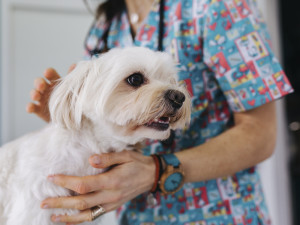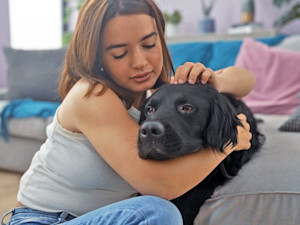Is Kennel Cough Contagious?
What you need to know about this super contagious disease. (Hint: There’s a vaccine.)

Share Article
In This Article:
How Is Kennel Cough Spread? Who Can Kennel Cough Be Spread To? How To Prevent Kennel Cough From Spreading? How Long Is Kennel Cough Contagious? Frequently Asked Questions
Kennel cough is a generic term for a number of different highly contagious respiratory infections in dogs. They are all lumped together with this term because they cause similar signs including coughing, sneezing, nasal congestion, and runny eyes and noses. Some of the common infectious agents that cause these signs include bacterial infections like Bordetella bronchiseptica and Mycoplasma species, as well as viruses like Parainfluenza, Influenza, Herpesvirus, Adenovirus type 2, and Canine Distemper.
Without specifically testing for which one a dog has, it’s impossible to know which bug is actually making them sick. And many times, a dog can have more than one of these pathogens at the same time. For this reason, other terms are used more often nowadays to describe this kind of respiratory infection such as canine infectious respiratory disease complex (CIRDC) or canine infectious tracheobronchitis. These are highly contagious illnesses that often spread quickly between dogs.
How is kennel cough spread?
The viruses and bacterial agents that cause kennel cough are spread in three main ways: one, through airborne particles released when a sick dog coughs or sneezes; two, through direct contact with a sick dog; or three, through contact with contaminated materials like toys, bedding, or crates. Some examples of how this transmission often happens include:

Being around other dogs who have kennel cough: These interactions may happen anywhere but the chances are increased when more dogs are together such as at doggy daycare, dog parks, boarding facilities, grooming salons, or animal shelters.
Sharing dog toys or food bowls: Any materials that a sick dog has come into contact with may be contaminated with these germs. Most of these pathogens can be destroyed with routine cleaning and disinfecting protocols.
Poor ventilation: Airborne particles will remain in the environment longer when ventilation is lacking. This means that any facility that has multiple dogs in a poorly ventilated space is at risk for increasing the spread of infectious particles.
Crowded conditions: Similarly, if there are lots of dogs together without adequate space, there are more chances for them to come into contact with one another and spread infectious disease. Crowded conditions also increase stress for many dogs, which can make them more susceptible to illness.
Who can kennel cough be spread to?
All of the pathogens that cause kennel cough are highly contagious between dogs. Some of these agents may also be contagious to other species.
Is kennel cough contagious to other dogs?
Yes, kennel cough is highly contagious between dogs. There are some very effective preventative measures, including vaccines and proper infection control procedures, that can help reduce the risk of transmission.
Is kennel cough contagious to cats?
Not all of the agents that cause kennel cough in dogs are contagious to cats. However, there are few that can be spread between the species. Bacterial agents like Bordetella bronchiseptica and Mycoplasma species are contagious to cats and can cause similar signs like coughing, congestion, and nasal discharge. Some strains of the flu, including Influenza H3N2, are contagious between dogs and cats as well.
Is kennel cough contagious to humans?
Most of the agents that cause kennel cough in dogs are not contagious to humans, however, Bordetella bronchiseptica can be contagious to humans in very rare cases. Immunosuppressed people would be most at risk.
How to prevent kennel cough from spreading?
There are many ways to be proactive in order to protect your pup and prevent kennel cough from spreading. This includes:
Vaccination: Ensuring your dog is up to date on all of their vaccines, and that they only socialize with other dogs who are fully vaccinated will dramatically reduce their risk for kennel cough. There are vaccines against many of the agents that cause kennel cough including Bordetella bronchiseptica, influenza, parainfluenza, adenovirus type 2, and distemper. While it is still possible for your dog to get some strains of kennel cough even if they are vaccinated, they tend to have much more mild signs with a shortened duration of illness if they do get sick.
Reduce risks for exposure: Whenever possible, try to avoid settings where your dog is likely to be at risk for exposure. This means avoiding places that are crowded with lots of dogs, poor ventilation, or where it may be difficult to know if the other dogs are vaccinated or healthy. If you do plan to send your dog to a doggie daycare or boarding facility, make sure they have strict rules for only accepting vaccinated dogs and dogs who are acting healthy. Check out the facilities to make sure they are not too crowded, that they have good cleaning protocols, and that there is appropriate ventilation.
Good hygiene: Almost all of the agents that cause kennel cough are easily destroyed by routine disinfectants. If you have a sick dog or come into contact with a sick dog, be sure to thoroughly clean the contaminated area including changing your own clothes and washing any materials like toys, bedding, bowls, or leashes that may be contaminated. The floors and furniture should also be cleaned thoroughly with a proper disinfectant.
Isolation: Isolation protocols are most important for facilities that may need to house both sick and healthy animals. Dogs with kennel cough or other contagious illnesses should be kept away from healthy pets to prevent transmission. This means that they should have a completely separate room with separate ventilation and a private area where they are walked to avoid all interactions with healthy pets. Staff members who care for animals in isolation ideally should also be separate from the staff caring for other animals. If that is not possible, the staff should wear personal Pprotective equipment (PPE), including gowns, gloves, and booties, to avoid tracking infectious particles to healthy animals on their clothes or skin.
If you have multiple pets at home, and only one is sick with kennel cough, it is very difficult to create this kind of extreme isolation protocol. Plus, it is likely that your other pets may have been exposed before you realized what was going on. Do your best to keep your healthy pets separated from anyone who is sick and make sure to disinfect your home and contaminated items routinely. If you are adopting a new pet that you know is sick, or who is coming from a high risk environment like a crowded animal shelter, it is a good idea to isolate the new pet for the first two weeks in case they are infected with anything contagious.Antibiotics: If your pup is sick and kennel cough is the likely diagnosis, you may be wondering whether or not antibiotics are necessary. In most cases, they are not. Antibiotics are only effective against bacterial infections, and many of the agents that cause kennel cough are viruses, so it will not treat them. For the same reason, it will not prevent these viruses from spreading to other dogs, either. Most of the time, kennel cough is a mild, self-limiting infection, meaning that most dogs’ immune systems will fight it off without any medication needed. They recover without needing antibiotics or other treatments. In more severe cases where a dog is very sick, has underlying medical conditions that make them less likely to be able to fight off the infection, or they are at risk for secondary bacterial infections, antibiotics may be part of the treatment plan.
How long is kennel cough contagious?
This can be a very difficult question for anyone to answer definitely because there are so many different agents that may be causing a dog’s signs. For example, Bordetella bronchiseptica, a bacterial infection that can cause kennel cough, can be shed by infected dogs for up to three months, even after they no longer have signs of illness. The best way to know for sure what’s going on with your pup is to have your vet test them for specific respiratory infections, usually using a PCR panel.
If you know which pathogens your pup has, it can help determine the best way to treat them, and also how long they may be contagious. You may be wondering if treatments like antibiotics will reduce how long your dog is contagious and that depends on a number of factors. First, you would need to know for sure if your dog has a bacterial infection that is actually susceptible to antibiotics. Since most of the agents that cause kennel cough are not destroyed by antibiotics, this usually will not shorten their illness or contagious period.
Second, it will depend whether your dog got the full course of antibiotics and completely cleared the infection. In most cases, since this can be difficult to determine and may be costly to perform repeated testing, the safest approach is to follow the general guidelines for kennel cough. This means presuming that any dog with kennel cough is contagious until they are symptom-free for at least two to three weeks. Once a dog seems to be back to normal, they should still be kept away from other pets for another two to three weeks to limit exposure to any infectious agents they may be shedding.
FAQs
What is kennel cough?
Kennel cough is a generic term for a number of different highly contagious respiratory infections in dogs, including bacterial infections like Bordetella bronchiseptica and Mycoplasma species, as well as viruses like Parainfluenza, Influenza, Herpesvirus, Adenovirus type 2, and Canine Distemper.
What are the signs of kennel cough?
Kennel cough signs can include coughing, sneezing, nasal congestion, and runny eyes and noses.
References
Borland S, et al. “Influenza A Virus Infection in Cats and Dogs: A Literature Review in the Light of the "One Health" Conceptopens in new tab”. Front Public Health, vol. 8, no. 84, March 2020. doi: 10.3389/fpubh.2020.00083.
Brooks, W. “Kennel Cough in Dogsopens in new tab”. Veterinary Partner, October 2024.
Lavan R, Knesl O: “Prevalence of canine infectious respiratory pathogens in asymptomatic dogs presented at US animal sheltersopens in new tab”. J Small Anim Pract, vol. 56, no. 9, 2015, pp. 572-76.
Maboni G, Seguel M, Lorton A, et al. “Canine infectious respiratory disease: New insights into the etiology and epidemiology of associated pathogensopens in new tab”. PLoS One, vol, 14, no. 4, 2019, pp. E0215817.

Dr. Shawna Garner, DVM
Dr. Shawna Garner, DVM is the lead vet Albright Veterinary Services. She is driven by a powerful desire to improve the relationship between our furry family members and their two-legged counterparts.

Dr. Bartley Harrison, DVM
Dr. Bartley Harrison is a veterinarian with more than 19 years of experience. He has treated a variety of species in emergency and speciality practices for both large and small animals. His primary interests as a vet are emergency medicine and critical care.
Related articles
![Dog laying down in dog bed and coughing]()
Why Is My Dog Coughing?
Seven reasons to be concerned when your dog is coughing.
Does Your Dog Need a Flu Shot?
“Sick as a dog” isn’t just a phrase.
![Cavalier King Charles spaniel puppy running in a garden]()
Parvovirus: How to Identify and Treat Parvo Symptoms in Puppies
The potentially deadly virus can be prevented with one simple step.
![Woman cuddling her sick black dog at home.]()
Diagnosing Kennel Cough in Dogs: A Comprehensive Guide
When to call the vet.
Can Cats Get Kennel Cough From Dogs?
The answer isn’t fun, but you can prevent this.
![husky with other dogs at doggie daycare]()
Working Pet Parent? Doggie Daycare to the Rescue!
Find one they love, but not so much they won’t wanna come home.








